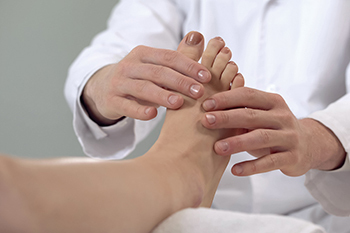
Flat feet, medically known as pes planus, occur when the long arch of the foot has not developed properly. Children are born with flat feet, but usually develop healthy arches by the age of five. Some people are genetically inclined to have flat feet. Others develop them as a result of a condition, such as diabetes, a stroke, or rheumatoid arthritis. Weight gain and standing for long periods of time can cause discomfort if you have flat feet, but most people do not experience pain from this condition. Wearing shoes with good arch support and cushioning in the heel can be a plus, if you have flat feet. A number of stretching and strengthening exercises can help to relieve any heel pain caused by flat feet. If being on your feet is a requirement of your job or lifestyle, wearing orthotics may be a good option. A podiatrist can assess the extent of the condition and prescribe custom shoe inserts to address it. For more information about flat feet and how they can be treated, it is a good idea to make an appointment with a podiatrist.
Flatfoot is a condition many people suffer from. If you have flat feet, contact Jon McCreary, DPM from Fort Worth Podiatry. Our doctor will treat your foot and ankle needs.
What Are Flat Feet?
Flatfoot is a condition in which the arch of the foot is depressed and the sole of the foot is almost completely in contact with the ground. About 20-30% of the population generally has flat feet because their arches never formed during growth.
Conditions & Problems:
Having flat feet makes it difficult to run or walk because of the stress placed on the ankles.
Alignment – The general alignment of your legs can be disrupted, because the ankles move inward which can cause major discomfort.
Knees – If you have complications with your knees, flat feet can be a contributor to arthritis in that area.
Symptoms
- Pain around the heel or arch area
- Trouble standing on the tip toe
- Swelling around the inside of the ankle
- Flat look to one or both feet
- Having your shoes feel uneven when worn
Treatment
If you are experiencing pain and stress on the foot you may weaken the posterior tibial tendon, which runs around the inside of the ankle.
If you have any questions please feel free to contact our office located in Fort Worth, TX . We offer the newest diagnostic and treatment technologies for all your foot and ankle needs.
